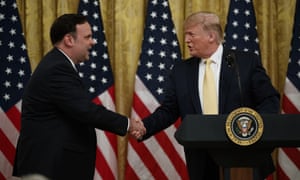
Donald Trump used a White House conference on social media to applaud far-right provocateurs, even as he conceded that some of them are extreme in their views.
The White House had invited a number of social media pundits and Republican lawmakers to discuss “opportunities and challenges” of the internet.
But the Trump administration did not include any representatives from major social media firms – including Facebook, Twitter or Google – instead inviting a mix of inflammatory internet personalities including rightwing Project Veritas founder James O’Keefe, pro-Trump activist Bill Mitchell, college Republican activist Charlie Kirk and Ben Garrison, a rightwing cartoonist who agreed not to attend amid widespread criticism from one of his virulently antisemitic cartoons.
During the summit, the president repeatedly bragged about his large Twitterfollowing and congratulated conservative attendees for communicating online “without having to go through the fake news filter”.
Trump complained he has stopped gaining as many followers on social media, suggesting a conspiracy without providing any evidence.
And he praised some of the most caustic voices on the right. “Some of you guys are out there,” he told them. “I mean it’s genius, but it’s bad,” the president said.
Following the event, Trump tweeted he is directing his administration to explore regulatory and legislative solutions “to protect the free speech rights of all Americans”.
The summit was followed by the president’s announcement in the Rose Garden he would abandon his effort to add a citizenship question to the census, but was moving forward with executive action for his administration to collect information on its own.
Several of the social media summit attendees appeared in the Rose Garden, with former White House staffer Sebastian Gorka being caught on tape shouting at reporter Brian Karem, calling him “a punk”. Several attendees egged Gorka on, and one person threatened violence.
The meeting on Thursday was the latest move from the Trump administration in response to its unsubstantiated claims that conservative voices are being discriminated against on social media platforms. In May, the White House launched a tool to allow users to report if they felt they had been censored on websites such as Facebook and Twitter.
Because no stakeholders from the social media companies being criticized were invited to the event, it amounts to “more of a press conference than a summit”, said Joan Donovan, the director of the Technology and Social Change Research Project at Harvard’s Shorenstein Center.
“Ultimately what is going on here is we are seeing a new form of adversarial media take shape,” she said. “Many of the people who are attending are avowedly partisan, and by banding together they are going to say they should be allowed to remain on platforms even if they break the terms of service.”
Trump has repeatedly claimed, without evidence, that policies on major social media platforms and websites such as Google discriminate against conservatives. In May, the president tweeted support of far-right figures banned from Facebook and said he was “monitoring and watching, closely!!” In June, he tweeted that Twitter should let conservatives back on the platform, saying: “It’s called Freedom of Speech, remember.” Senator Ted Cruz is holding a hearing next week centered on allegations that Google censors conservative voices.
Facebook’s terms of service ban individuals and organizations that “promote or engage in violence and hate, regardless of ideology”, which the company cited when it removed a number of rightwing pundits in May. Twitter’s terms of service prohibit “hateful conduct”, including threats or harassment on the basis of race, sexual orientation, gender or religion. It also bans “threats, glorifications of violence, bullying, targeted harassment and the incitement of others to harass”.
Social justice groups have warned the summit on Thursday could call attention away from these rules and intimidate technology companies into allowing hate speech on their platforms. Muslim Advocates said it is encouraging social media platforms to ignore the summit on Thursday and instead focus on their content moderation strategies.
“Enforcing basic standards of decency on social media isn’t censoring conservative speech. After all, countless conservatives continue to use these platforms without spreading bigotry,” the group said.
The group is asking people to sign a petition calling on social media companies to ban hate speech.
[“source=theguardian”]
